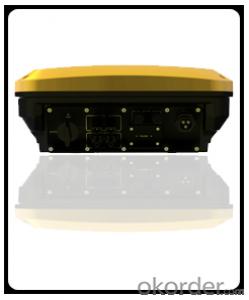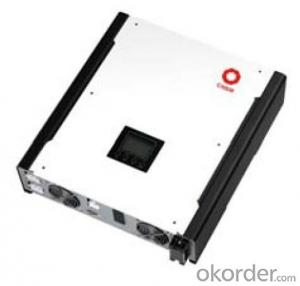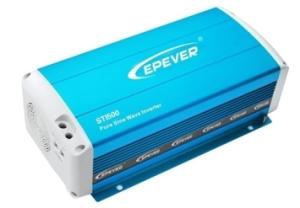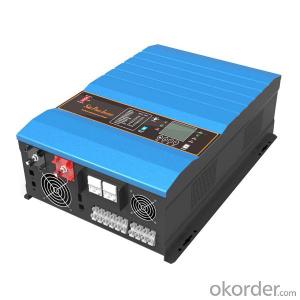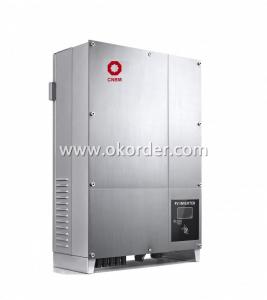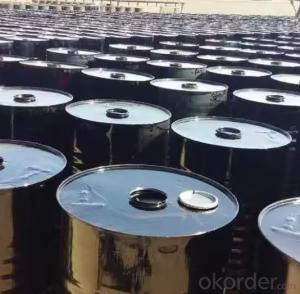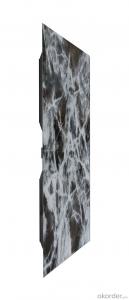Solartec 1500 on grid inverter with WIFI
- Loading Port:
- Shanghai
- Payment Terms:
- TT OR LC
- Min Order Qty:
- -
- Supply Capability:
- 10000 set/month
OKorder Service Pledge
Quality Product, Order Online Tracking, Timely Delivery
OKorder Financial Service
Credit Rating, Credit Services, Credit Purchasing
You Might Also Like
Solartec 1500, 2000,2500,3000,3600,4000,4600,5000 1MPPT, single phase IP 65 New mold with Pure thick aluminum crust. Safe Flexible SimpleEfficient
■ Efficiency of up to 97.6 %
■ Transformerless
■ Integrated DC switch
■ Comprehensive protection functions
■ LCD backlight
■ For indoor and outdoor installation
■ ‘Plug and play’connection for easy installation
■ Friendly interface, easy to install and maintain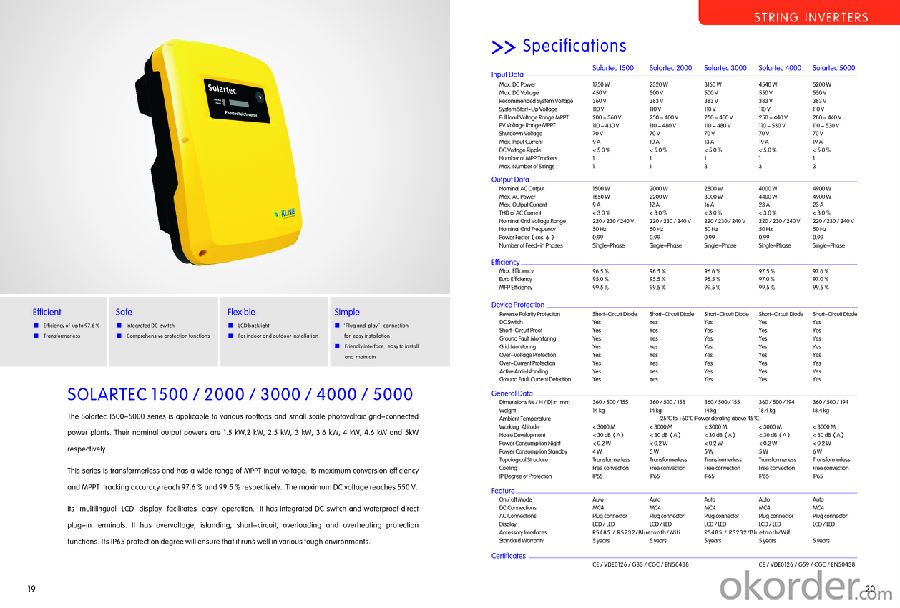
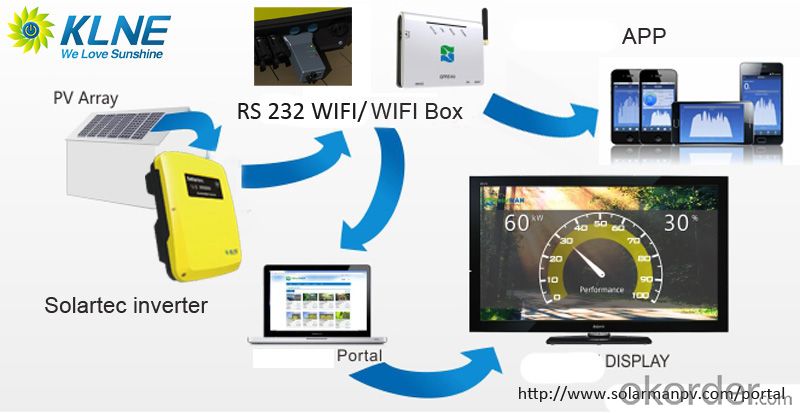
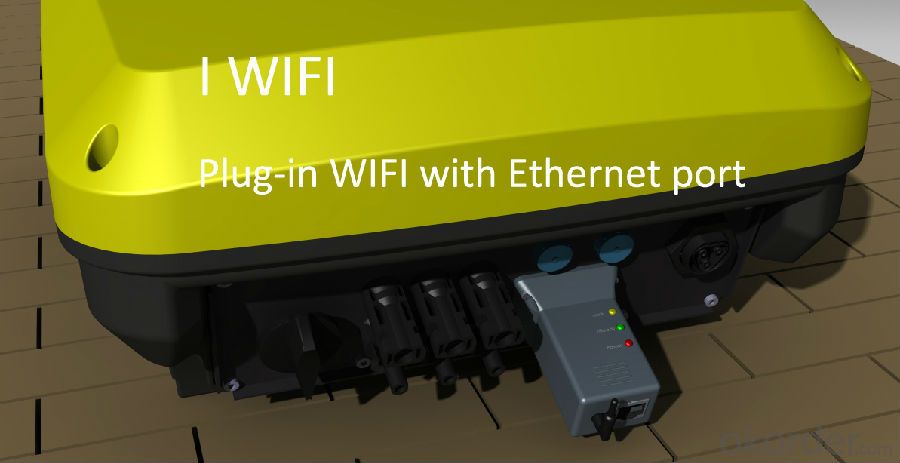
Beijing Kinglong New Energy Technology Co., Ltd.
3rd. floor, Caihong North Building West Entrance, 11 Xinxi Road, Shang Di, Haidian Dist, Beijing, China
T.:+86(0)1062988159-678 M.:+86 1800 1179 441
Skype:klnevivian
Skype:klnevivian
E:vivian@kinglongpower.com
Website: www.kinglongpower.com
- Q:What are the key safety features to look for in a solar inverter?
- Some key safety features to look for in a solar inverter include: 1. Overvoltage and overcurrent protection: The inverter should have mechanisms in place to prevent excessive voltage or current levels, ensuring the safety of the system and connected devices. 2. Ground fault protection: This feature detects and protects against faults in the grounding system, reducing the risk of electric shock or damage to the inverter. 3. Temperature monitoring and control: The inverter should have built-in temperature sensors to monitor and regulate its internal temperature. This helps prevent overheating and potential fire hazards. 4. Arc fault detection: Arc faults can occur in electrical systems and pose significant safety risks. An inverter with arc fault detection can identify and mitigate these faults, minimizing the chance of electrical fires. 5. Rapid shutdown capability: In the case of an emergency or maintenance, the inverter should have the ability to rapidly shut down the solar system. This feature helps ensure the safety of installers, firefighters, or anyone working on the system. 6. Compliance with safety standards: Look for inverters that meet relevant safety standards, such as UL 1741, IEC 62109, or other local regulations. These standards ensure that the inverter has undergone rigorous testing and meets specific safety requirements. Overall, a solar inverter with these key safety features can help enhance the safety and reliability of a solar power system.
- Q:What are the different output waveforms of a solar inverter?
- The different output waveforms of a solar inverter can vary depending on the type of inverter being used. The most common types include pure sine wave, modified sine wave, and square wave. Pure sine wave inverters produce an output waveform that closely resembles the standard AC power provided by utility companies, making them ideal for powering sensitive electronics. Modified sine wave inverters produce a stepped waveform that may not be as smooth as a pure sine wave, but can still power most household appliances. Square wave inverters produce a more basic waveform with abrupt transitions between positive and negative voltage, typically used for powering simple devices or tools.
- Q:Can a solar inverter be used with different types of solar cell technologies?
- Yes, a solar inverter can be used with different types of solar cell technologies. Solar inverters are designed to convert the direct current (DC) produced by solar cells into alternating current (AC) that can be used to power homes and businesses. They are typically compatible with various solar cell technologies, such as monocrystalline, polycrystalline, thin-film, and hybrid solar cells. This versatility allows the solar inverter to work efficiently with different types of solar panels, maximizing the energy production from the solar system.
- Q:Can a solar inverter be installed in a residential area?
- Yes, a solar inverter can be installed in a residential area. In fact, residential areas are one of the most common locations for solar power installations, including solar inverters. These inverters help convert the DC electricity generated by solar panels into AC electricity that can be used to power homes and other electrical devices.
- Q:How do you choose the right brand of solar inverter?
- When choosing the right brand of solar inverter, several factors should be considered. First, look for a brand with a good reputation and a track record of reliability. It's important to choose a brand that has been in the market for some time and has positive customer reviews. Additionally, consider the warranty and after-sales service provided by the brand. Look for a brand that offers a comprehensive warranty and has a strong customer support system in place. Finally, consider the specific requirements and features you need from the inverter, such as its power output, efficiency, and compatibility with your solar system. Comparing different brands based on these factors will help you make an informed decision and choose the right brand of solar inverter for your needs.
- Q:How does the voltage regulation affect the performance of a solar inverter?
- Voltage regulation is crucial for the optimal performance of a solar inverter. It ensures that the output voltage of the inverter remains within a specific range, typically the utility grid's voltage standards. Proper voltage regulation prevents overloading or underloading of the electrical devices connected to the inverter, safeguarding them from potential damage. Additionally, maintaining a stable output voltage enhances the efficiency and reliability of the solar inverter, allowing it to deliver consistent power to the connected load and maximize the overall system performance.
- Q:Can a solar inverter be used in a solar-powered telecommunications system?
- Yes, a solar inverter can be used in a solar-powered telecommunications system. The solar inverter is responsible for converting the direct current (DC) produced by solar panels into alternating current (AC) that can be used to power various devices in the system, including telecommunications equipment.
- Q:Can a solar inverter be used with a portable solar panel system?
- Yes, a solar inverter can be used with a portable solar panel system. A solar inverter is responsible for converting the direct current (DC) produced by the solar panels into usable alternating current (AC) electricity. Whether it is a portable or stationary solar panel system, a solar inverter is necessary to convert the DC power into AC power that can be used to power various devices and appliances.
- Q:What is the role of a power optimizer in a solar inverter?
- The role of a power optimizer in a solar inverter is to maximize the energy output from each individual solar panel by optimizing the voltage and current levels. It ensures that even if one panel is shaded or underperforming, it does not affect the overall system performance. Power optimizers also provide real-time monitoring and diagnostics, allowing for better system maintenance and performance tracking.
- Q:Can a solar inverter be used in mobile or portable solar systems?
- Yes, a solar inverter can be used in mobile or portable solar systems. Portable solar systems often include a solar panel, battery, and inverter to convert the DC (direct current) power generated by the solar panel into AC (alternating current) power that can be used to power various devices and appliances. The inverter helps ensure compatibility and usability of the generated solar power in these mobile or portable setups.
1. Manufacturer Overview |
|
|---|---|
| Location | |
| Year Established | |
| Annual Output Value | |
| Main Markets | |
| Company Certifications | |
2. Manufacturer Certificates |
|
|---|---|
| a) Certification Name | |
| Range | |
| Reference | |
| Validity Period | |
3. Manufacturer Capability |
|
|---|---|
| a)Trade Capacity | |
| Nearest Port | |
| Export Percentage | |
| No.of Employees in Trade Department | |
| Language Spoken: | |
| b)Factory Information | |
| Factory Size: | |
| No. of Production Lines | |
| Contract Manufacturing | |
| Product Price Range | |
Send your message to us
Solartec 1500 on grid inverter with WIFI
- Loading Port:
- Shanghai
- Payment Terms:
- TT OR LC
- Min Order Qty:
- -
- Supply Capability:
- 10000 set/month
OKorder Service Pledge
Quality Product, Order Online Tracking, Timely Delivery
OKorder Financial Service
Credit Rating, Credit Services, Credit Purchasing
Similar products
New products
Hot products
Hot Searches
Related keywords

